
Think about this. In a world where search is done by voice, a lot of the screen-based, visual and clickable data which is surfaced via a keyboard is suddenly obsolete. This means very big changes for the business models of Google, Apple and Amazon for starters. It also explains why they are throwing so much money at the problem – a miss by one could result in the shift of billions of dollars in value to a rival. That rival may not be a company we currently understand to be a credible threat.
The clues to how seriously the big companies are viewing the shift can be seen in the new products they offer. For example, next month Google will start selling Google Home, a speaker/microphone device which sits in the house and can theoretically run your life (US$130, choice of colours including mango, marine, grey). Saying OK Google will activate the system so that you can add an event to your calendar, set the temperature of your thermostat, or stream your favourite song – and of course book an Uber or a movie seat.
And tired of having its search ride along on Apple’s phone (and also of the lack of control of the hardware on the phones that use its Android operating system) it has launched its own device, the Google Pixel. Closer integration of software and hardware, which will be about voice going forward, is clearly on its mind.

Apple’s voice aspirations can be divined with a close look at the iPhone 7 and more particularly the newly released wireless headphones, with their improved functionality and upgraded voice recognition.
But the best-placed player in voice among the disruptor giants seems to be Amazon. Its Echo speaker/microphone with the Alexa voice assistant can already perform hundreds of tasks now – good enough for the time being, and (machine) learning on the job so that it will be able to do thousands and even maybe millions of jobs down the track. Alec Baldwin did the ad for this (re-ordering his $300 Bresciani socks, if you must know).
Why is this important? Because as people gravitate to voice (as they should in the car because fiddling with the device is illegal and dangerous) and away from buttons (because talking is cooler than typing) it will change the way we do things just as radically as the change that came from moving from dial-up to broadband.
And as the intelligence gets better – because there has been a massive jump in this capability in the past two years – the results will get better. Meaning that Siri won’t give you the list of dumb answers you currently get when you ask it for the nearest burger joint, but instead will provide directions (because it knows you are in the car), queues and desserts. It will contextualise your query.
But hang on. Siri giving you the burger joint search results? That’s Google’s job..!
Yes it is. The default search engine on the iPhone is Google. And Apple’s Siri is aiming to change all that.
So for Apple, voice represents a major, actually giant, opportunity, being a slice of a business which is all Google’s at present, and which it currently does badly. For Google, it’s more a rear-guard action – the company has to defend against a powerful and enabled competitor that has nothing to lose and everything to gain. So Google is defending with its own voice product, but also attacking with the Pixel, its iPhone competitor.
And both are dealing with the amazon that is, well, Amazon.
Also, don’t forget there are big players like Baidu and Alibaba in China that are very active. And this is before we even think about the well-capitalised start-ups that are coming.
And it’s not only that the search battleground will move to voice. For example, Amazon Dash is a selection of wi-fi enabled product-specific buttons designed to facilitate re-ordering of a given product. Expect to find the one for Huggies in the nursery, or the Gillette button in the bathroom.
Push it and you will be re-ordering whatever you bought last time, delivered to you with or the rest of your order, or any way you like.
The details of your nappy purchase – made from home during the day with a dash button (so I’m guessing you are not in a 9-5 office job) or the razors (so a bloke) will form part of the dataset which is being built up around you and which is being used to sell you more stuff.
For Amazon, voice and Dash form part of a toolkit which is also now extending into physical stores. The stores won’t really carry heaps of stock – they are there to give a sample of what is on offer, for fulfilment later, and again with the aim of capturing even more data about you.
The move to voice, and buttons like Dash, is changing the central marketing questions away from just being about colours and fonts and into those related to the data and intelligence of the ‘personalities’ in the voice search assistants. So when you ask Siri about that burger, maybe it suggests McDonalds. Not just because it’s a burger shop too, or because it’s midnight and earlier that night you asked directions to the best bars. But also because the marketing guru in McDonalds sorted the whole thing out with Apple and paid to put it there on Siri for just such an occasion.
The point is that the work that now goes into a marketing campaign will also have to incorporate machine based intelligence so that the correct answer (from a sales perspective) is surfaced by a voice query.
Australia’s $7bn data centre | Harry Morrow features in SBS On the Money
18 Dec 2025Anshu Sharma features on EquityMates Best of the Best Podcast
18 Dec 2025Share this Post


